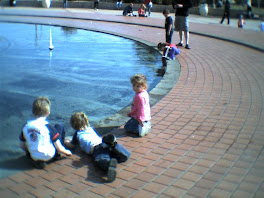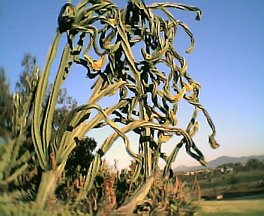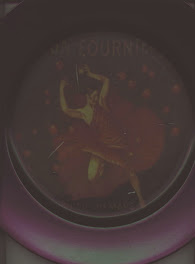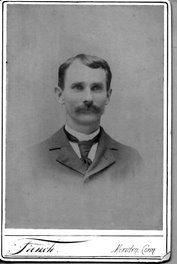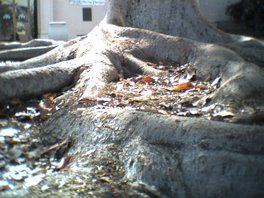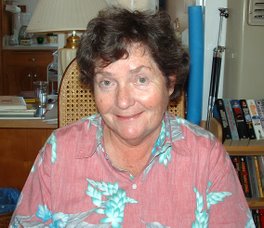Nature, in the form of wind and wildfire, certainly has our attention here in Southern California. I read now about "wild land - urban interface." Millions of Americans have built homes in the piney woods and picturesque hills of sage and brush. Wildfires form part of our local ecology. Unfortunately, there are now so many homes and other buildings that a natural process becomes a human disaster. Evacuating 500,000 people is a precaution. I think about 4,000 homes are considered threatened, some of them are already gone. It does look like the aftermath of a war.
I'm not immediately affected, except by the poor air quality. I live in the coastal part of the city, on the first wide ridge or plateau up from the Pacific. Fires are burning inland, past the first line of hills that run north and south. Roads have been closed and reopened. We're all being advised to stay home if we can, conserve electricity, yet turn on air conditioners part of the time to filter what we're breathing. A lot of schools and businesses are closed. Many schools are evacuation centers. The local NBC TV station ran breaking fire news and video at least 48 hours in a row. Evacuees were sitting in Qualcomm Stadium with their water bottles watching those big screens, trying to see if their homes were spared. A lot of them must still be doing that. Everybody who isn't immediately affected has a family member or friend who is. The scam artists and identity thieves are busy, but so are the everyday heroes and helpers.
I'm OK. The dry Santa Ana weather always causes bleeding sinuses and respiratory problems. The ash makes breathing more difficult. I've been out for a few hours at a time for groceries or post office. Small urban businesses, especially eating places, are open. Everywhere people are filling in for employees who can't get through closed roads, or are living on the floor of a stadium entry with their families, or are totally distracted by the danger to, or loss, of their homes. Some people's quality of life will be rock bottom for the foreseeable future. So many repetitions of, "We're alive. We're together. That's all that matters."
Just Learning

Kitchen Studio
Thursday, October 25, 2007
Sunday, October 14, 2007
Friday, October 12, 2007
PostSecret
Blogspot recommends PostSecret which is a strange and interesting project. People send a secret, anonymously, with a postcard or index card that has artwork. You just have to see it.
Sunday, October 7, 2007
Pot Scrubber
Jon King's October 5th post on The Effective Life is titled "Oh, pot scrubber, my hero." He pays attention to the unnoticed people and objects that support our lives.
The title instantly reminded me of Brother Laurence, the saint of small tasks well done. He is famous for washing the bottoms of the wooden trenchers used as plates at his monastery, when no one else thought the undersides mattered.
I picture him looking a little like Ziggy, straining to reach over the edge of a huge restaurant sized metal sink filled with trenchers. Wait a minute. They didn't have running water. Water was fetched in a pail, and precious. You wouldn't throw wooden plates in to soak, anyhow. They'd warp.
Change the picture. Zig - uh - Brother Laurence - seated beside a big pile of trenchers, say 200 of them. He's as likely to be outdoors as inside, and he has clean sand to scrub the plates. There is probably very little food left on the plates, maybe a little grease or a sodden bit of bread. When you clean two or three metal plates with sand on a camping trip, you just wipe the sand off your hands, on your jeans. Does scrubbing 200 trenchers with sand hurt your hands? Do you have a scrub brush to help? Cleaning the undersides means twice the work, twice the time. Did he try to polish them? Not much finish left after hundreds of scorings with knives, I suppose. At the time, people didn't know about bacteria that could lurk unseen on imperfectly cleaned plates, e.coli, for instance. Unwittingly, by cleaning trenchers carefully, the kitchen assistant may have saved lives, or at least some very unpleasant illnesses.
Whew.
The title instantly reminded me of Brother Laurence, the saint of small tasks well done. He is famous for washing the bottoms of the wooden trenchers used as plates at his monastery, when no one else thought the undersides mattered.
I picture him looking a little like Ziggy, straining to reach over the edge of a huge restaurant sized metal sink filled with trenchers. Wait a minute. They didn't have running water. Water was fetched in a pail, and precious. You wouldn't throw wooden plates in to soak, anyhow. They'd warp.
Change the picture. Zig - uh - Brother Laurence - seated beside a big pile of trenchers, say 200 of them. He's as likely to be outdoors as inside, and he has clean sand to scrub the plates. There is probably very little food left on the plates, maybe a little grease or a sodden bit of bread. When you clean two or three metal plates with sand on a camping trip, you just wipe the sand off your hands, on your jeans. Does scrubbing 200 trenchers with sand hurt your hands? Do you have a scrub brush to help? Cleaning the undersides means twice the work, twice the time. Did he try to polish them? Not much finish left after hundreds of scorings with knives, I suppose. At the time, people didn't know about bacteria that could lurk unseen on imperfectly cleaned plates, e.coli, for instance. Unwittingly, by cleaning trenchers carefully, the kitchen assistant may have saved lives, or at least some very unpleasant illnesses.
Whew.
Saturday, October 6, 2007
Missa Luba
This fabulous recording of a Congolese boys' choir came out in 1965. I used to play it over and over. I hadn't heard it for decades until I ran across a copy in great condition recently. One side is the Mass in Latin, sung to Congolese rhythms and drums. The other side has popular and folk songs in Congolese.
A new acquaintance had just returned from Senegal, where he studied drumming while others in the group studied art and textiles. Rick has a record player, and was glad to listen with me to this marvelous music. He then played some records pressed in Africa, including a woman who sings lush music in Twee.
I'm giving the record to my son, who plans to send me a version on CD.
A new acquaintance had just returned from Senegal, where he studied drumming while others in the group studied art and textiles. Rick has a record player, and was glad to listen with me to this marvelous music. He then played some records pressed in Africa, including a woman who sings lush music in Twee.
I'm giving the record to my son, who plans to send me a version on CD.
Thursday, October 4, 2007
Quotables 1
"Why pray when you can worry?"
Credit to vibenergy at eBay under Art. Her accompanying cat caricatures are a hoot - or is that a yowl?
Credit to vibenergy at eBay under Art. Her accompanying cat caricatures are a hoot - or is that a yowl?
Subscribe to:
Comments (Atom)

